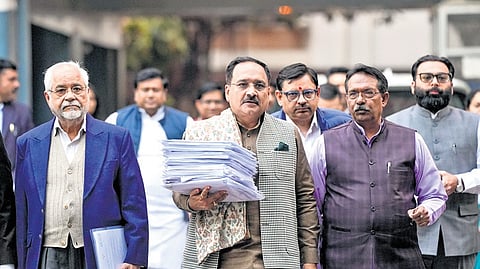

NEW DELHI: A Delhi BJP delegation consisting of the state unit president and MPs met Chief Election Commissioner on Friday to lodge a protest against the alleged inclusion of illegal voters, including Rohingya and Bangladeshi infiltrators.
The delegation demanded that their complaint be looked into on priority to ensure a transparent and fair Delhi Assembly election. Led by Delhi BJP chief Virendra Sachdeva, the delegation submitted a detailed representation before the Election Commission (EC) along with primary evidence running into 5,000 pages.
Notably, AAP National Convener Arvind Kejriwal, along with senior party leaders, on Wednesday met the EC demanding that no further voter deletions be carried out in any assembly constituency to safeguard the integrity of the electoral process amidst a recent row of vote deletions.
The AAP delegation also submitted 3,000 pages of evidence to support their stand on the issue.
Sachdeva told EC that it is surprising that lakhs of new voters are registered every time after the conclusion of the Lok Sabha election and before the start of the Delhi assembly election. This is abnormally higher than the yearly voter summary revision exercise, he alleged.
Sachdeva said the BJP’s booth level agents (BLAs) and other workers have been going across all 70 assembly constituencies and have found widespread discrepancies in the voters’ list: infiltrators registered as voters in Delhi, duplicate voters, and nonexistent address voters. Every constituency in Delhi has a huge number of dead or permanently shifted voters in Delhi, he added.
He requested the EC to run a campaign against the enrollment of illegal voters as well as against bogus voting. Delhi BJP chief also urged the EC to run a radio and print media campaign dissuading and warning the bogus voters about the possibility of imprisonment.
BJP MP and advocate Bansuri Swaraj kept a list of 18 pieces of evidence before the EC. She cited pages from voter lists of several assembly constituencies across the city where even on the same page, a single person with the same family details and address stands repeatedly registered as a voter with a different Election Photo Identity Card (EPIC).
Swaraj submitted at least six cases with evidence from different assemblies where voters of a particular community stand registered on nonexistent addresses.
She also presented cases where the same family of voters of one community stand registered in more than one assembly constituency.